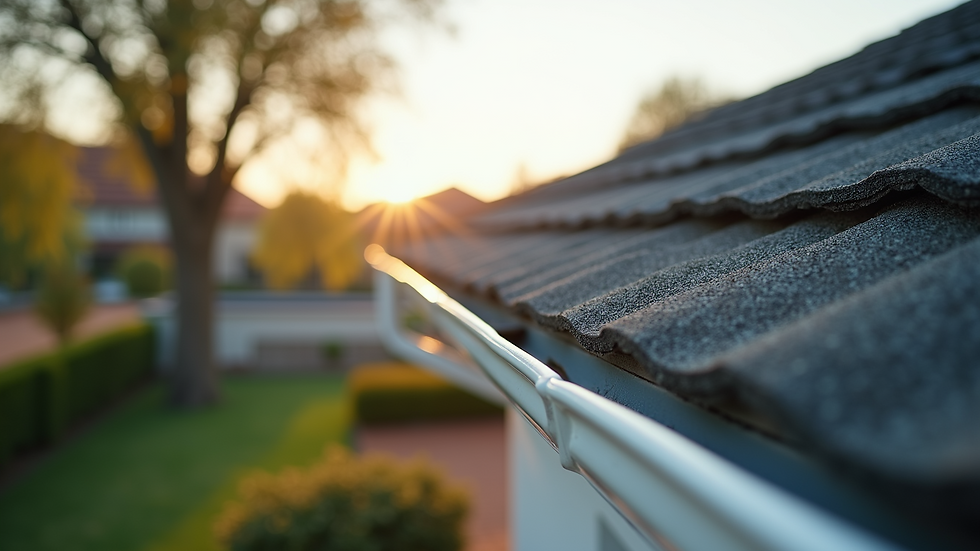Why Regular Roof Inspections Matter
- napavalleyroofing
- Sep 30, 2025
- 4 min read
Your roof is one of the most important parts of your home. It protects you from the elements, keeps your family safe, and adds to your home's overall value. However, many homeowners overlook the importance of regular roof inspections. This can lead to costly repairs and even dangerous situations. Understanding why roof inspections matter can save you money and stress in the long run.
The Importance of Roof Inspections for Longevity and Safety
Regular roof inspections are essential to maintaining the health and safety of your home. Over time, roofs are exposed to harsh weather conditions such as rain, wind, snow, and sun. These elements can cause damage that is not always visible from the ground.
Why should you schedule inspections regularly?
Early detection of damage: Small issues like cracked shingles or loose flashing can be fixed before they turn into major problems.
Prevent leaks: Water damage can lead to mold growth and structural issues inside your home.
Extend roof lifespan: Routine maintenance keeps your roof in good condition, delaying the need for a full replacement.
Safety assurance: A damaged roof can be a hazard, especially during storms or heavy winds.
Ignoring these inspections can result in expensive repairs or even the need for a complete roof replacement much sooner than expected.

How Roof Inspections Help Save Money and Avoid Stress
Many homeowners think roof inspections are an unnecessary expense. However, the cost of an inspection is minimal compared to the price of major repairs or replacements. Here’s how inspections help you save money:
Catch minor issues early: Fixing small problems like missing shingles or clogged gutters is cheaper than repairing water damage or structural decay.
Insurance benefits: Some insurance policies require proof of regular maintenance to cover roof damage claims.
Increase home value: A well-maintained roof adds to your property’s market value and appeal.
Avoid emergency repairs: Sudden leaks or collapses can disrupt your life and cost a lot more to fix quickly.
Scheduling a professional roof inspection can give you peace of mind and protect your investment.

What does a roof inspection include?
A thorough roof inspection covers several key areas to assess the condition of your roof. Here’s what a professional inspector typically looks for:
Shingles and Tiles: Checking for cracks, curling, missing pieces, or granule loss.
Flashing and Seals: Inspecting around chimneys, vents, and skylights for gaps or damage.
Gutters and Downspouts: Ensuring they are clear of debris and properly attached.
Roof Structure: Looking for sagging, rot, or signs of water damage inside the attic.
Ventilation: Confirming that vents are functioning correctly to prevent moisture buildup.
Moss and Algae: Identifying growth that can deteriorate roofing materials.
Debris and Cleanliness: Removing leaves, branches, and other debris that can trap moisture.
After the inspection, the professional will provide a detailed report with recommendations for repairs or maintenance.

When to Schedule Your Roof Inspection
Knowing the right time to schedule a roof inspection can help you avoid problems before they start. Here are some key times to consider:
Annually: A yearly inspection is ideal to catch wear and tear from seasonal weather changes.
After severe weather: Storms, heavy winds, hail, or snow can cause hidden damage.
Before buying or selling a home: A roof inspection is crucial for real estate transactions.
If you notice signs of damage: Leaks, missing shingles, or water stains inside your home are red flags.
When your roof is aging: Most roofs last 20-25 years; inspections become more important as your roof gets older.
Regular inspections keep you informed about your roof’s condition and help you plan maintenance or replacement.
How to Find a Reliable Roofing Inspector Near You
Finding a trustworthy professional is key to getting an accurate roof inspection. You want someone experienced, licensed, and insured. Searching for a roofing inspector near me can connect you with local experts who understand the specific roofing materials and weather conditions in your area.
Tips for choosing the right inspector:
Check reviews and references.
Verify credentials and insurance.
Ask about their inspection process and what is included.
Request a written report with photos.
Compare prices but don’t choose solely based on cost.
A qualified roofing inspector will provide valuable insights and help you protect your home.
Taking Action After Your Roof Inspection
Once you have your inspection report, it’s important to act on the recommendations promptly. Here’s what you can do:
Schedule repairs: Address urgent issues like leaks or broken shingles immediately.
Plan maintenance: Clean gutters, trim overhanging branches, and remove moss regularly.
Budget for replacement: If your roof is near the end of its life, start planning financially for a new roof.
Keep records: Maintain documentation of inspections and repairs for future reference or insurance claims.
By staying proactive, you ensure your roof remains a strong barrier against the elements.
Regular roof inspections are a smart investment in your home’s safety, value, and comfort. Don’t wait for problems to appear - schedule an inspection today and keep your roof in top shape for years to come.

Comments